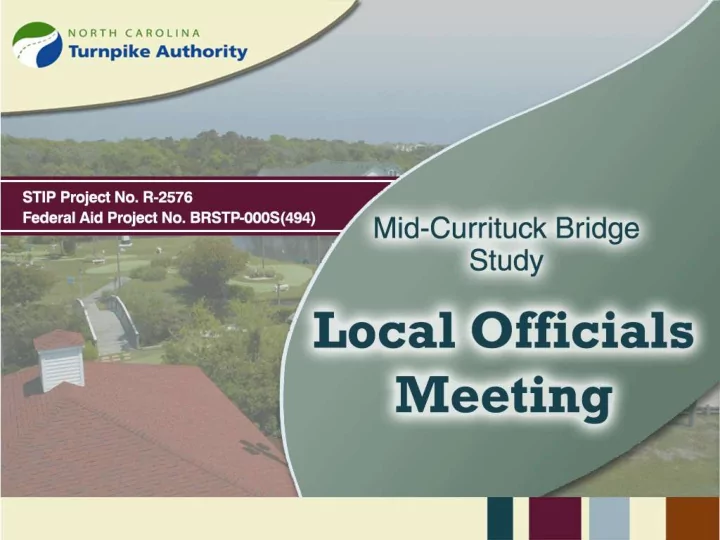

Introductions • NCTA • NCDOT • FHWA • Others
Agenda • Background Information • Project Purpose and Need • Description of Detailed Study Alternatives • Project Funding • Draft EIS • Recommended Alternative • Boating and Related Issues
2005 – Mid-Currituck Bridge becomes candidate toll facility
Project Area
Project Purpose and Need • To substantially improve traffic flow on the project area’s thoroughfares (NC 12 and US 158) • To substantially reduce travel time for persons traveling between the Currituck County mainland and the Currituck County Outer Banks • To substantially reduce hurricane clearance time for residents and visitors who use US 158 and NC 168 during a coastal evacuation With the proposed project in place, future travel time between the Currituck County mainland and Outer Banks is expected to be substantially shorter for many trips, and overall congestion throughout the project area also is predicted to be reduced.
Detailed Study Alternatives
Alternative Concepts Considered in the Draft EIS • Additional road and/or bridge alternatives • Low cost alternatives • Ferry alternatives • Additional Mid-Currituck Bridge corridor alternatives
Project Funding • Revenue Bonds • TIFIA Loans • Gap Appropriation • Public Private Partnership
Public Private Partnership • Private concessionaire will: – Design – Finance – Build – Operate – Maintain • Done under a contract with NCTA • NCTA will own the bridge
How much would tolls cost? • 2007 preliminary traffic and revenue study indicated a one-way toll of $6 to $12 • Initial toll rates ultimately will be based on Investment Grade Traffic and Revenue Study • All toll revenue is used to finance, construct, operate, and maintain the bridge • Legislation requires that when the bridge is paid for, the toll be removed
How will tolls be collected?
What is a Draft EIS?
What is a Draft EIS? • Why is the project needed? • What are the reasonable alternatives? • What are the impacts? • How can impacts be mitigated? • Summarizes public and agency coordination
Who is involved in the project?
Who Else Is Involved? Local Stakeholders Residents Property owners Traveling public Local governments RPO Towns Counties Elected officials
Alternatives Evaluated by Project Impacts • Human Environment • Physical Environment • Cultural Environment • Natural Environment
Technical Evaluation of… • Wetlands and Streams • Water Quality • Endangered Species • Floodplains • Historic and Archaeological Resources • Noise • Community Resources • Relocations • Air Quality • Hazardous Materials • Farmlands
The Alternative Selection Process Recommendation made in Draft EIS based on technical evaluation of all factors Public Hearing/Comment process provides affirmation -- or -- sufficient justification for changing the recommendation
The Alternative Selection Process Not a “vote of the people” Not a political decision Based on sound, defendable, repeatable technical evidence with consideration of all public comments Process dictated by federal law (NEPA)
Recommended Alternative is MCB4 “Recommended Alternative” is only a recommendation.
Boating and Related Issues • Boating activity study underway • Will determine need for a navigation span with added height • If you are a boater or rent boats please provide vessel information on your comment form
Participate in the Hearing Speak at the Public Hearings Drop your comments in the box Mail your comments E-mail your comments
Comments Due
What happens next? • Review and evaluate comments • August 2010 – Identify the Preferred Alternative • September 2010 – Final EIS • December 2010 – Record of Decision (ROD) • Early 2011 – Begin Construction • Late 2014 – Open to traffic
QUESTIONS
Recommend
More recommend